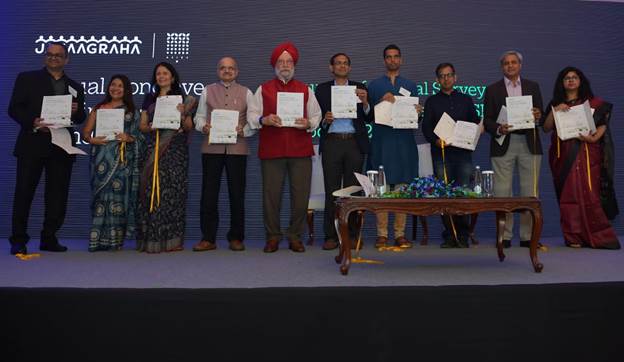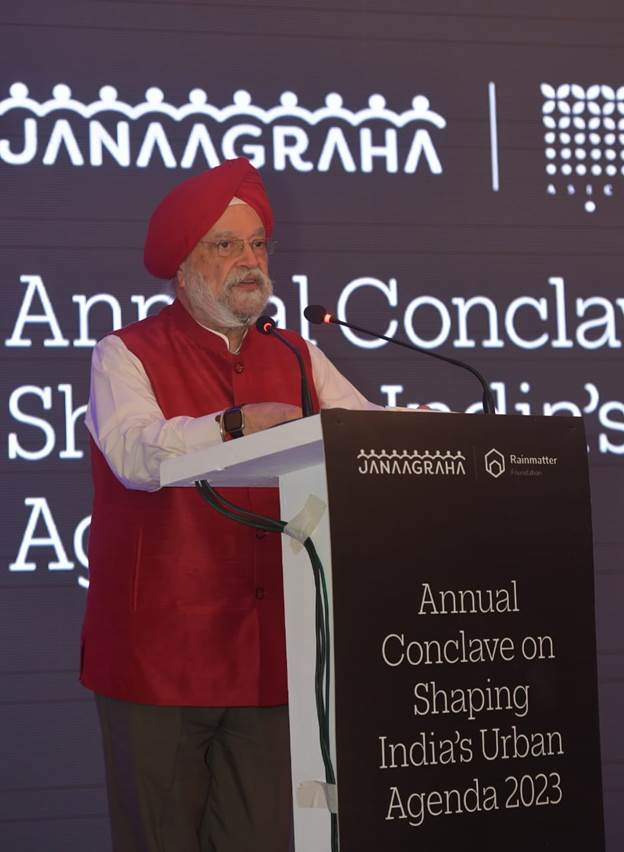Since 2014, over Rs. 18 lakh crores invested in urban transformation: Hardeep S Puri
The ASICS report provided the first nation-wide analysis of local governance in Indian cities, and has since, expanded on the scope of city-based analysis and evaluation of municipal performance through a citizen-centric lens, said Shri Hardeep Singh Puri, Minister of Housing & Urban Affairs and Petroleum & Natural Gas. The Minister released today the sixth edition of the Annual Survey of India’s City-Systems, i.e., ASICS 2023 report at an event, co-hosted by Janaagraha and Rainmatter Foundation at Hotel Imperial, New Delhi.

Calling the report a meticulous and praise-worthy effort, the Minister noted that this report includes the study of 82 municipal legislations, 44 town and country planning acts, 176 allied acts, rules and notifications, 32 other policy/scheme documents, and 27 additional datasets pertaining to urban development in India.

As regards the 10 key recommendations made in the report, The Minister said that these 10 ‘instruments of change’ can deepen the principles of decentralisation and devolution in urban governance and revitalize the spirit of the 74th Constitutional Amendment Act.
Shri Puri noted that the report has acknowledged the unprecedented actions taken by Government under visionary leadership of Prime Minister Shri Narendra Modi, in working towards this agenda of decentralization and devolution in urban governance. He mentioned about the six-fold increase in the Finance Commission grants to Urban Local Bodies (ULBs) from the 13th Finance Commission to the 15th Finance Commission. He stressed that the 15th Finance Commission distinguished between million-plus urban agglomerations and other cities, providing for 100 per cent outcome-based funding of approximately Rs 38,196 crores to 50 urban agglomerations with incentives for air quality, water supply and sanitation.
Adding further, he said that the AMRUT programme instituted 11 mandatory reforms in ULBs, including improving creditworthiness of cities, operationalising municipal bonds, and the professionalisation of the municipal cadre. 12 cities have already raised more than Rs. 4,384 crores through municipal bonds, he emphasised.
The government has disbursed unprecedented funds to undertake urban planning reforms such as modernisation of building bye laws; transit-oriented development; adoption of Transferable Development Rights; integration of blue and green infrastructure through nature-based solutions; affordable Housing through in-situ rehabilitation; GIS-based master planning; and Online Building Permission Systems (OBPS).
Treating our cities as an opportunity rather than a challenge, Shri Puri said that the Prime Minister has brought about a revolution in India’s urban development paradigm. More than Rs. 18 lakh crores have been invested since 2014 in the transformation of our cities and towns, he emphasised.
Since 2014, the Minister said that the Government has undertaken the most comprehensive and planned urbanisation programme anywhere in the world. He talked about the initiatives/missions such as PMAY (Urban), Swachh Bharat Mission – Urban, AMRUT, Smart Cities Mission, PM SVANidhi mission and DAY-NULM, that have turned out to be transformational in growth and development of the urban spaces.
The Minister said that under PMAY (Urban), almost 1.19 crore houses have been sanctioned. More than 1.13 crore houses have already been grounded and 77 lakh delivered, he said.
Speaking about Swachh Bharat Mission – Urban, the Minister said that the mission has brought about a pan-India behavioural shift towards Swachhata. Solid waste processing has gone up from 17% in 2014 to 76% today. He expressed the confidence of achieving 100 percent waste processing in coming years.
The Minister said that AMRUT has addressed basic social infrastructure such as water and sewerage in 500 cities by providing more than 1.72 crore water tap connections and 1.35 crore sewer connections. Now, AMRUT 2.0 is aiming further ahead by aspiring to make our cities ‘Water Secure’, he said.
Under the Smart Cities Mission, he said that 6,069 projects worth over Rs. 1.1 lakh crores have been completed.
The Minister highlighted that at present we have the fifth-largest metro network in the world with around 871 kms of metro lines laid and after the construction of 905 kms of metro network more, India will become the second-largest metro network in the world.
“More than 34.2 lakh livelihoods have been created under the DAY-NULM mission. The mission imparted skill training to 14.9 lakh candidates”, he added further.
Referring to the Urban Areas as Spaces of aspiration and opportunity, the Minister said that the Cities are the hubs of economic growth and innovation. Much of India’s economic progress lies in the productivity of its cities. In harnessing the potential for high growth that exists in our cities, he said that we need to focus on the ULBs which are the primary interface of governance for our citizens. ULBs provide the political avenue for citizens to raise their issues, he observed.
Wherever local elected leaders, Mayors, Municipal Commissioners and state governments have worked in tandem, we have seen incredible results, he noted. He added, “in the Swachh Bharat Mission, Mayors were seen leading advocacy and awareness campaigns in every ward and colony across the country”.
The Minister said, “We must look to empower our Mayors and City Councils because they have successfully demonstrated that they are capable of driving global action at the local level”, he said. He mentioned about the first-ever Mayors’ Conference held in Varanasi in December 2021 as a confidence-building measure towards this direction.

